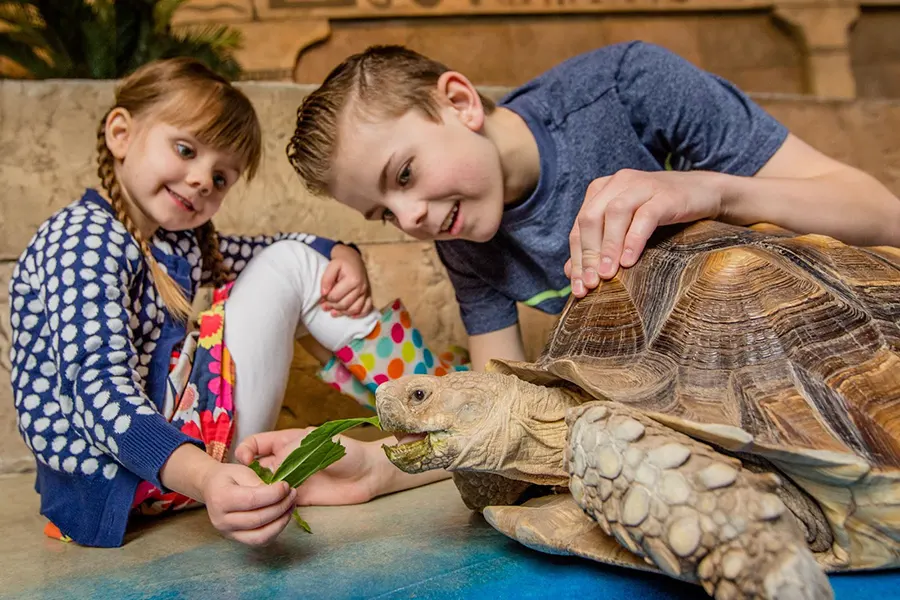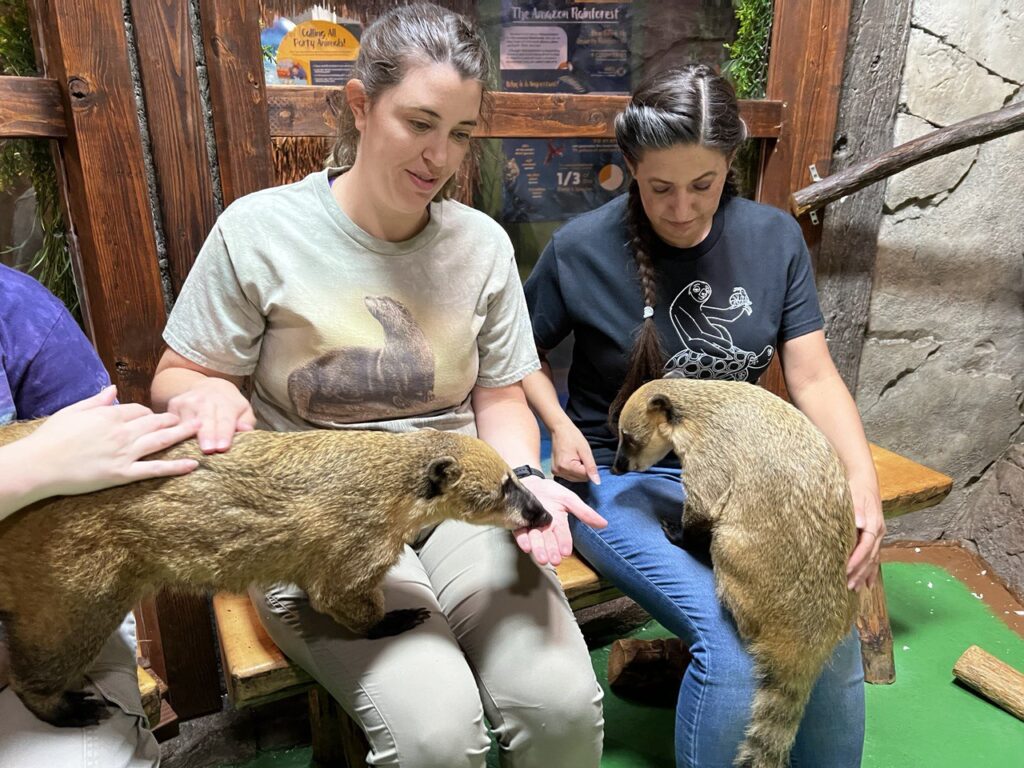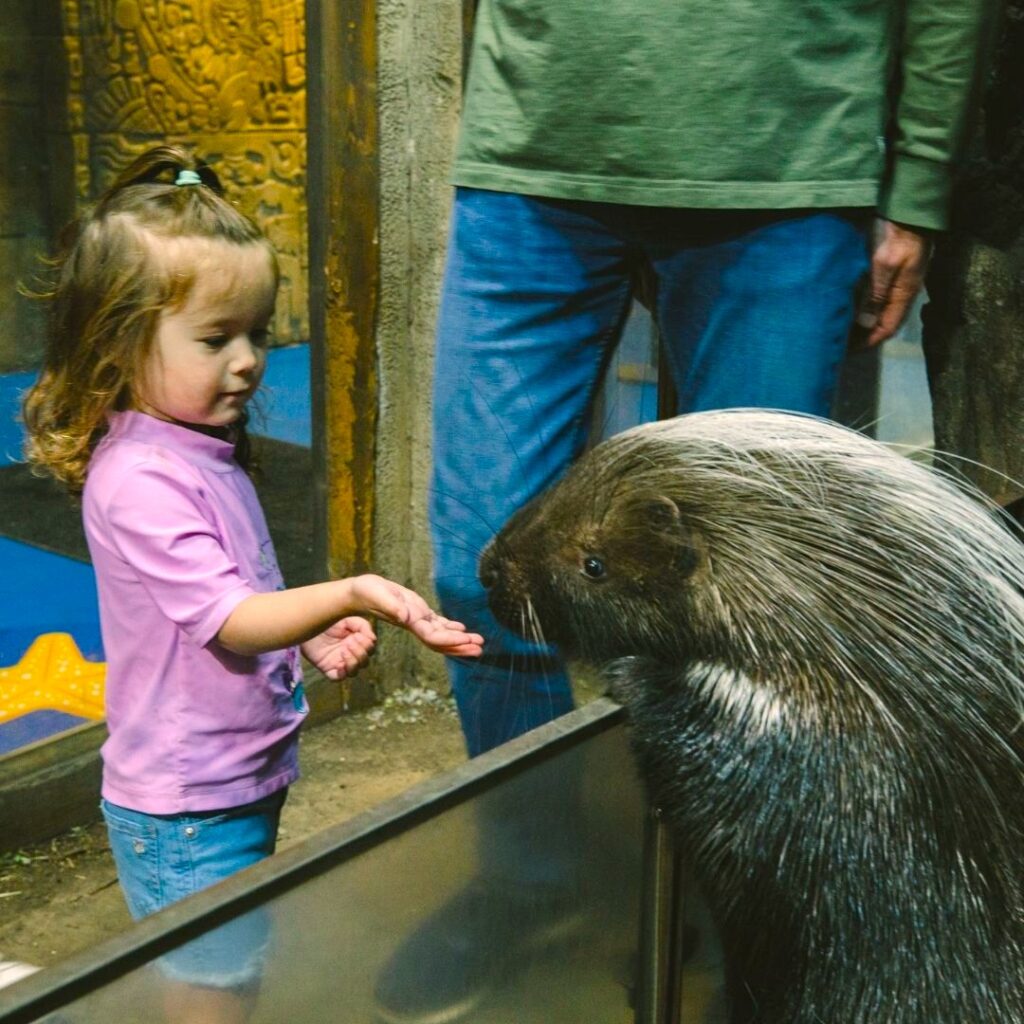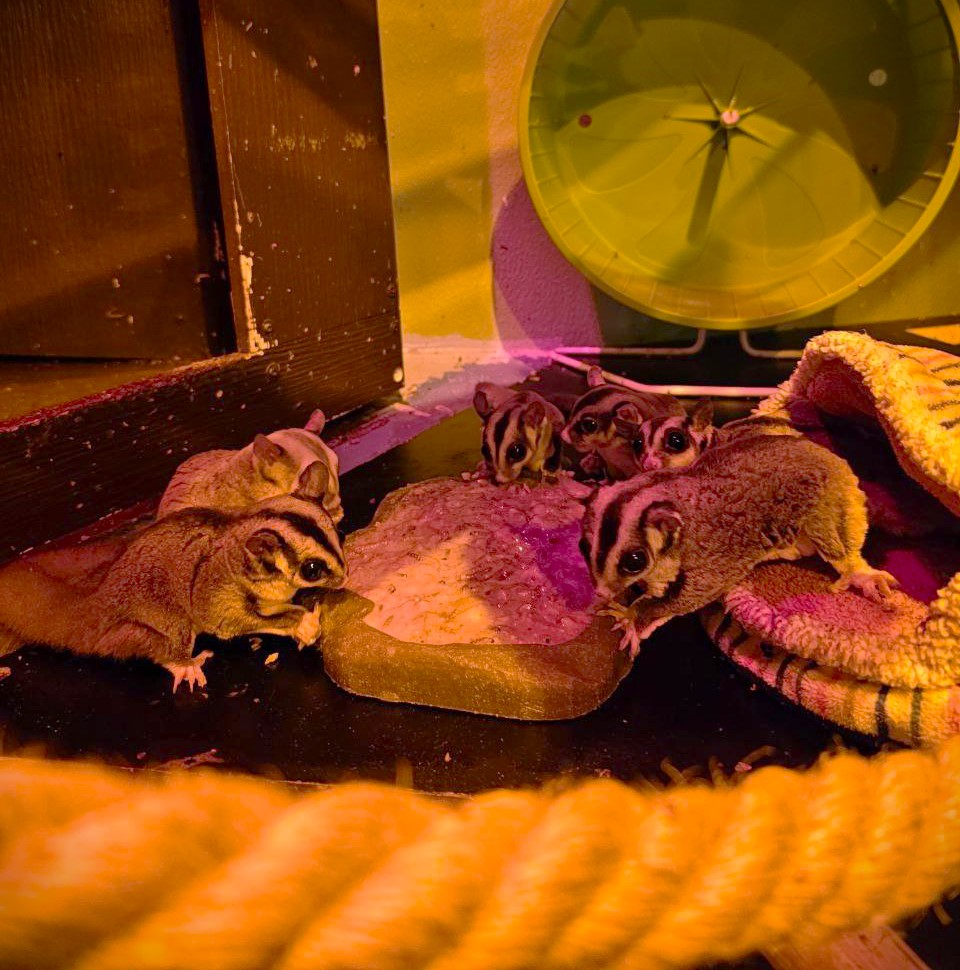How Are Tortoises at SeaQuest Cared For?
Share it on:

At SeaQuest, expert care for tortoises is not just our duty; it’s our specialty. As custodians of these venerable creatures, we are committed to providing environments that precisely replicate their natural habitats and meet their specific dietary needs. Tortoises deserve rich, full lives; SeaQuest endeavors to provide this.
Tortoise Care at SeaQuest
Our commitment to providing a nurturing environment for our tortoises at SeaQuest is exemplified through our care programs. We understand that the well-being of these creatures hinges on the conditions in which they live and the expertise of those who look after them. We specifically train our herpetology team in the care and management of tortoises. The team must ensure that each animal receives the attention and tailored care necessary for their health and happiness.
Stringent conservation principles and ethical care standards guide our practices. Responsible stewardship is vital to preserving tortoises and their natural environments at SeaQuest. We actively participate in conservation efforts and adopt sustainable practices that contribute to the welfare of our tortoises and the broader ecological balance. Our steadfast commitment to the well-being of these animals guides all of our actions, from habitat design to conservation choices.
Understanding Tortoises: Natural Behaviors and Habitats
Understanding tortoises is essential for caring for them. Here is what SeaQuest prioritizes when caring for these graceful animals.
What Is a Tortoise’s Natural Habitat?
Tortoises are incredibly adaptive creatures, inhabiting various ecosystems, from arid deserts to lush rainforests. Each environment poses unique challenges and provides different resources, from sparse, sun-baked landscapes to dense, moisture-rich forests. At SeaQuest, we meticulously replicate these diverse habitats to meet the specific needs of each tortoise species.
Dietary Needs and Nutrition for Tortoises
A tortoise’s diet primarily consists of a wide array of fresh vegetables, some fruits, and necessary supplements to ensure a balanced intake of nutrients. At SeaQuest, we tailor each tortoise’s diet according to the specific dietary requirements of each species, ensuring that all nutritional needs are met for optimal health. Our herpetology experts also add supplements and necessary vitamins to prevent diseases common among captive tortoises. They also conduct regular dietary assessments to ensure each tortoise digests their meals properly and, more importantly, that they enjoy it! This proactive approach helps maintain these animals’ long-term health and vitality.
Social Behavior and Space Requirements
While many tortoise species exhibit solitary behavior, understanding and accommodating their social and spatial needs is crucial for their well-being. At SeaQuest, we design our tortoise enclosures to respect these animals’ solitary nature while providing ample space for exercise and exploration.
Additionally, we consider the social dynamics of tortoises, facilitating occasional interactions and group housing where species compatibility allows. This careful management of their living conditions reflects our commitment to creating an environment that fosters health, comfort, and natural behavior among the SeaQuest tortoises.
The Health and Well-being of Tortoises
Keeping our tortoises happy and healthy is our mission. These are the strategies we employ to ensure that these reptiles stay content.
Habitat Design and Environmental Control
The meticulous design of tortoises’ habitats is the cornerstone of ensuring their health and well-being at SeaQuest. We aim to closely mimic their natural environments to provide a comforting and familiar setting. This includes creating temperature gradients that simulate those found in their native habitats and providing various warm and cool areas within the enclosure to facilitate natural thermoregulation behaviors. Hiding spots are also crucial, offering the tortoises a retreat for stress reduction and privacy.
Equally important is the control of humidity within their habitats, which is rigorously monitored and adjusted to maintain optimal levels. Proper humidity is essential for maintaining healthy shell and skin conditions, preventing pyramiding in shells, and aiding in the normal shedding process. Additionally, we provide clean and accessible water sources to ensure hydration, which is vital for their health and digestive processes.
Veterinary Care and Regular Health Monitoring
At SeaQuest, veterinarians specializing in reptile medicine constantly monitor the health of our tortoises. These experts conduct routine health checks to ensure that each tortoise is at its peak health and swiftly address any issues. These issues may range from shell deformities to infections and parasite management—all of which we aim to prevent. However, if any of these issues arise, we address them promptly.
To minimize the stress on our tortoises, we employ non-invasive methods for health assessments whenever possible. This approach not only improves the accuracy of the diagnostics but also preserves the well-being and comfort of the tortoises, ensuring they remain calm and unstressed during routine checks. This proactive and compassionate approach to veterinary care is a fundamental part of our commitment to the health and well-being of every tortoise in our care at SeaQuest.
Educational and Conservation Efforts
Our mission at SeaQuest is to give animals great homes and educate the public about our astounding creatures. Here are a few of the ways SeaQuest gives back to the cause.
SeaQuest’s Role in Tortoise Conservation
We actively participate in various conservation programs that aim to protect tortoise species and their natural habitats worldwide. This involvement helps mitigate the impacts of habitat destruction, illegal wildlife trade, and other threats these species face in the wild. Additionally, we support and research tortoise health, behavior, and breeding in captivity. This research is crucial for developing better care practices and understanding the needs of tortoises, ultimately contributing to their longevity and quality of life both in human care and in the wild.
Our educational outreach programs play a pivotal role in raising awareness about the importance of tortoise conservation. Through these programs, we inform the public about the critical threats tortoises face and the steps that can be taken to mitigate these dangers. Educating our visitors fosters a deeper understanding and appreciation for these remarkable creatures and the efforts needed to protect them.
Engaging the Public in Tortoise Care and Conservation
SeaQuest offers numerous opportunities for visitors to engage with and learn about tortoises. Our educational exhibits and interactive experiences are designed to highlight the unique care, behavior, and environmental needs of tortoises, promoting a respectful and informed understanding of these animals. Visitors can observe how tortoises interact with their environments, learn about their dietary needs, and understand the importance of proper habitat design.
Furthermore, we encourage responsible pet ownership by educating prospective and current tortoise owners about the complexities of caring for these animals. We aim to ensure that anyone considering a tortoise as a pet is fully prepared to provide a safe, nurturing, and appropriate home. Additionally, we support and promote tortoise conservation efforts, inspiring our visitors to take active roles in conservation, whether through direct action or support of programs and initiatives dedicated to preserving these species for future generations. This comprehensive approach to public engagement is integral to our mission at SeaQuest, combining education with action to make a lasting impact on tortoise conservation.
SeaQuest’s commitment to the care, health, and conservation of tortoises is woven into every aspect of its operations. Together, we can significantly impact tortoises’ lives and ensure their survival and flourishing for future generations. Join us in our mission to protect and cherish these ancient ambassadors of our planet’s biodiversity.







